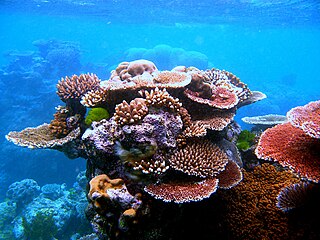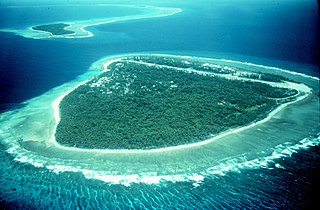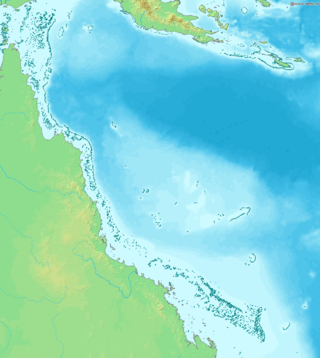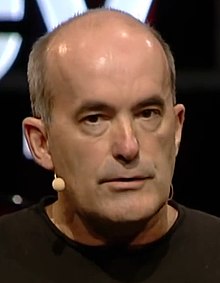Career
In 1999, Hoegh-Guldberg published a paper [6] using data from CSIRO and Germany predicting that most corals across the planet will not survive the next century, and the Great Barrier Reef will die in 20–30 years. His evaluation was poorly received at the time, with most experts trying to find fault with his long term predictions but failing to do so. Since then, however, reefs globally have undergone significant bleaching since then, [7] the latest studies documenting an 89% decline in new corals in the Great Barrier Reef compared to historical levels. [8] As of July 2019, he is an author in 521 journal articles, and has been cited 54,532 times. [9] He is currently a Professor of Marine Studies at the University of Queensland. [10] In 2010, Hoegh-Guldberg was appointed as the inaugural Director of the Global Change Institute, [11] a collaborative research hub aimed to address the impacts of climate change.
In 2017, Hoegh-Guldberg was one of the Chief Scientific Advisors to the Netflix documentary Chasing Coral . [12] Following this, alongside the CEO of The Ocean Agency Richard Vevers, he started the 50 Reefs initiative to identify a number of reefs globally that have the best chance to survive the impacts of climate change and subsequently repopulate neighboring reefs. [13] After releasing a study in March 2018 identifying 50 reefs, [14] Bloomberg Philanthropies invested $86 million in the Vibrant Oceans initiative focused on protecting reefs across the planet. [15]
Hoegh-Guldberg has been an author of various IPCC reports, including being the coordinating lead author of the Oceans Chapter with fifth assessment published in 2014. [16] [17] On 8 October 2018, the Intergovernmental Panel on Climate Change (IPCC) released the Special Report on Global Warming of 1.5 °C, of which one of the findings was that we may have less than 12 years to avoid a temperature rise of over 1.5 °C. [18] Hoegh-Guldberg was a Coordinating Lead Author of the report, and was a Coordinating Lead Author on Chapter 3: Impacts of 1.5 °C of Global Warming on Natural and Human Systems. In an interview with UQ News, he said "A key finding of the report is that 1.5°C is not a safe level of global warming; however it is much safer than 2.0 °C", and that "We are still going to see many challenges at 1.5°C". [19] The IPCC report has been used as justification for climate action movements, including by Greta Thunberg. [20]

Corals are colonial marine invertebrates within the class Anthozoa of the phylum Cnidaria. They typically form compact colonies of many identical individual polyps. Coral species include the important reef builders that inhabit tropical oceans and secrete calcium carbonate to form a hard skeleton.

The Great Barrier Reef is the world's largest coral reef system, composed of over 2,900 individual reefs and 900 islands stretching for over 2,300 kilometres (1,400 mi) over an area of approximately 344,400 square kilometres (133,000 sq mi). The reef is located in the Coral Sea, off the coast of Queensland, Australia, separated from the coast by a channel 160 kilometres (100 mi) wide in places and over 61 metres (200 ft) deep. The Great Barrier Reef can be seen from outer space and is the world's biggest single structure made by living organisms. This reef structure is composed of and built by billions of tiny organisms, known as coral polyps. It supports a wide diversity of life and was selected as a World Heritage Site in 1981. CNN labelled it one of the Seven Natural Wonders of the World in 1997. Australian World Heritage places included it in its list in 2007. The Queensland National Trust named it a state icon of Queensland in 2006.

Coral bleaching is the process when corals become white due to various stressors, such as changes in temperature, light, or nutrients. Bleaching occurs when coral polyps expel the zooxanthellae that live inside their tissue, causing the coral to turn white. The zooxanthellae are photosynthetic, and as the water temperature rises, they begin to produce reactive oxygen species. This is toxic to the coral, so the coral expels the zooxanthellae. Since the zooxanthellae produce the majority of coral colouration, the coral tissue becomes transparent, revealing the coral skeleton made of calcium carbonate. Most bleached corals appear bright white, but some are blue, yellow, or pink due to pigment proteins in the coral.

Southeast Asian coral reefs have the highest levels of biodiversity for the world's marine ecosystems. They serve many functions, such as forming the livelihood for subsistence fishermen and even function as jewelry and construction materials. Corals inhabit coastal waters off of every continent except Antarctica, with an abundance of reefs residing along Southeast Asian coastline in several countries including Indonesia, the Philippines, and Thailand. Coral reefs are developed by the carbonate-based skeletons of a variety of animals and algae. Slowly and overtime, the reefs build up to the surface in oceans. Coral reefs are found in shallow, warm salt water. The sunlight filters through clear water and allows microscopic organisms to live and reproduce. Coral reefs are actually composed of tiny, fragile animals known as coral polyps. Coral reefs are significantly important because of the biodiversity. Although the number of fish are decreasing, the remaining coral reefs contain more unique sea creatures. The variety of species living on a coral reef is greater than anywhere else in the world. An estimation of 70-90% of fish caught are dependent on coral reefs in Southeast Asia and reefs support over 25% of all known marine species. However, those sensitive coral reefs are facing detrimental effects on them due to variety of factors: overfishing, sedimentation and pollution, bleaching, and even tourist-related damage.

Robert Merlin Carter was an English palaeontologist, stratigrapher and marine geologist. He was professor and head of the School of Earth Sciences at James Cook University in Australia from 1981 to 1998, and was prominent in promoting climate change denial.
The Australian Marine Conservation Society (AMCS) is an Australian environmental not-for-profit organisation. It was founded in 1965 as the Queensland Littoral Society before changing its name to the Australian Littoral Society and then finally in 1995 to its current title. It works on protecting the health and vitality of Australia's coasts and oceans.

The Great Barrier Reef is the world's largest reef systems, stretching along the East coast of Australia from the northern tip down at Cape York to the town of Bundaberg, is composed of roughly 2,900 individual reefs and 940 islands and cays that stretch for 2,300 kilometres (1,616 mi) and cover an area of approximately 344,400 square kilometres (133,000 sq mi). The reef is located in the Coral Sea, off the coast of Queensland in northeast Australia. A large part of the reef is protected by the Great Barrier Reef Marine Park.
The Great Barrier Reef: Biology, Environment and Management is a 2007 book by Pat Hutchings, Mike Kingsford and Ove Hoegh-Guldberg. It describes the organisms and ecosystems of Australia's Great Barrier Reef, and the biological, chemical and physical processes that influence them. Issues discussed include climate change, coral bleaching, coral disease and coral reef fishing. The book includes a field guide to help people identify the common animals and plants on the reef. The book has illustrations and contributions from 33 international experts.

Human activities have substantial impact on coral reefs, contributing to their worldwide decline.[1] Damaging activities encompass coral mining, pollution, overfishing, blast fishing, as well as the excavation of canals and access points to islands and bays. Additional threats comprise disease, destructive fishing practices, and the warming of oceans.[2] Furthermore, the ocean's function as a carbon dioxide sink, alterations in the atmosphere, ultraviolet light, ocean acidification, viral infections, the repercussions of dust storms transporting agents to distant reefs, pollutants, and algal blooms represent some of the factors exerting influence on coral reefs. Importantly, the jeopardy faced by coral reefs extends far beyond coastal regions. The ramifications of climate change, notably global warming, induce an elevation in ocean temperatures that triggers coral bleaching—a potentially lethal phenomenon for coral ecosystems.
The resilience of coral reefs is the biological ability of coral reefs to recover from natural and anthropogenic disturbances such as storms and bleaching episodes. Resilience refers to the ability of biological or social systems to overcome pressures and stresses by maintaining key functions through resisting or adapting to change. Reef resistance measures how well coral reefs tolerate changes in ocean chemistry, sea level, and sea surface temperature. Reef resistance and resilience are important factors in coral reef recovery from the effects of ocean acidification. Natural reef resilience can be used as a recovery model for coral reefs and an opportunity for management in marine protected areas (MPAs).

There are many effects of climate change on oceans. One of the main ones is an increase in ocean temperatures. More frequent marine heatwaves are linked to this. The rising temperature contributes to a rise in sea levels. Other effects include ocean acidification, sea ice decline, increased ocean stratification and reductions in oxygen levels. Changes to ocean currents including a weakening of the Atlantic meridional overturning circulation are another important effect. All these changes have knock-on effects which disturb marine ecosystems. The main cause of these changes is climate change due to human emissions of greenhouse gases. Carbon dioxide and methane are examples of greenhouse gases. This leads to ocean warming, because the ocean takes up most of the additional heat in the climate system. The ocean absorbs some of the extra carbon dioxide in the atmosphere. This causes the pH value of the ocean to drop. Scientists estimate that the ocean absorbs about 25% of all human-caused CO2 emissions.

A Mesophotic coral reef or mesophotic coral ecosystem (MCE), originally from the Latin word meso (meaning middle) and photic (meaning light), is characterised by the presence of both light-dependent coral and algae, and organisms that can be found in water with low light penetration. MCEs occur at depths beyond those typically associated with coral reefs as the Mesophotic ranges from brightly lit to some areas where light does not reach. Mesophotic Coral Ecosystem (MCEs) is a new, widely-adopted term used to refer to mesophotic coral reefs, as opposed to other similar terms like "deep coral reef communities" and "twilight zone", since those terms sometimes are confused due to their unclear, interchangeable nature. Many species of fish and corals are endemic to the MCEs making these ecosystems a crucial component in maintaining global diversity. Recently, there has been increased focus on the MCEs as these reefs are a crucial part of the coral reef systems serving as potential refuge area for shallow coral reef taxa such as coral and sponges.

Tourism is one of the major industries in the Great Barrier Reef region. Approximately 2.19 million people visit the Great Barrier Reef each year. According to the WWF, tourism of the area contributes $5.89 billion a year to the Australian economy, and employs approximately 69,000 people. Ove Hoegh-Guldberg sees the key competitive advantage of the Great Barrier Reef as opposed to other, closer, reef tourism destinations is the region's reputation as being "the most pristine coral reef on the planet". The GBRMPA states that careful management, which includes permits for camping and all commercial marine tourism within the Great Barrier Reef Marine Park, seeks to ensure that tourists have minimal impact on the reef. However, rising incidences of widespread coral bleaching, coastal development, and tourism impacts have taken a toll the biodiversity of the reef.
The Coral Triangle Day was established on June 9, to celebrate and raise awareness of the ocean conservation and protection, especially on the Coral Triangle, the world's epicenter of marine biodiversity. Intended as an open-sourced event, the day is celebrated by individuals, organizations, and establishment concerned on the Coral Triangle. The Coral Triangle day was observed the first time on June 9, 2012, in conjunction with the World Oceans Day on June 8.

Ocean acidification threatens the Great Barrier Reef by reducing the viability and strength of coral reefs. The Great Barrier Reef, considered one of the seven natural wonders of the world and a biodiversity hotspot, is located in Australia. Similar to other coral reefs, it is experiencing degradation due to ocean acidification. Ocean acidification results from a rise in atmospheric carbon dioxide, which is taken up by the ocean. This process can increase sea surface temperature, decrease aragonite, and lower the pH of the ocean. The more humanity consumes fossil fuels, the more the ocean absorbs released CO₂, furthering ocean acidification.
The Great Barrier Reef is the world's largest coral reef system off the coast of Australia.

A marine heatwave is a period of abnormally high ocean temperatures relative to the average seasonal temperature in a particular marine region. Marine heatwaves are caused by a variety of factors, including shorter term weather phenomena such as fronts, intraseasonal events, annual, or decadal (10-year) modes like El Niño events, and longer term changes like climate change. Marine heatwaves can have biological impacts on ecosystems at individual, population, and community levels. MHWs have led to severe biodiversity changes such as coral bleaching, sea star wasting disease, harmful algal blooms, and mass mortality of benthic communities. Unlike heatwaves on land, marine heatwaves can extend for millions of square kilometers, persist for weeks to months or even years, and occur at subsurface levels.

Jean-Pierre Gattuso is a French ocean scientist conducting research globally, from the pole to the tropics and from nearshore to the open ocean. His research addresses the biology of reef-building corals, the biogeochemistry of coastal ecosystems, and the response of marine plants, animals and ecosystems to global environmental change. He is also interested in transdisciplinary research, collaborating with social scientists to address ocean-based solutions to minimize climate change and its impacts. He is currently a CNRS Research Professor at Sorbonne University.
Joan Ann ("Joanie") Kleypas is a marine scientist known for her work on the impact of ocean acidification and climate change on coral reefs, and for advancing solutions to environmental problems caused by climate change.
Janice Lough is a climate scientist at the Australian Institute of Marine Science (AIMS) at James Cook University, researching climate change, and impacts of temperature and elevated CO2 on coral reefs. She was elected to the Australian Academy of Science in 2022 for her research in climate change, coral reefs, and developing high resolution environmental and growth histories from corals, particularly the Great Barrier Reef.















